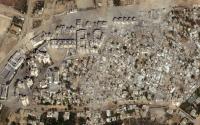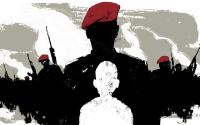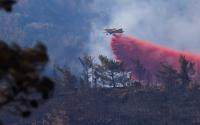By Philip P. PanMarch 13, 2003
ANKARA, Turkey, March 12 -- Hardening their position, Turkey's leaders insist they need further assurances about postwar Iraq before they allow U.S. troops to deploy along the border for an attack. In a new complication, they also are refusing to let the Pentagon use Turkish airspace without approval from parliament.
Despite the acceleration of U.S. military preparations elsewhere, Turkey's leaders appear to be in no hurry to schedule a new vote in parliament on the U.S deployment or use of airspace. They say they are confident that the United States will wait for them because an invasion of Iraq without Turkey's help would be riskier, take longer and result in more casualties.
But U.S. officials say the Turkish government has misjudged the Bush administration's determination to move quickly against Iraq and are increasingly pessimistic about Turkey's participation. If Turkey does not offer its full cooperation before President Bush orders an attack, they warned, it risks losing the billions of dollars in aid that the United States has offered and damaging relations with a key ally.
"There's a concern that their measurements of Washington's thinking are not accurate," said a diplomat in Ankara, the capital. "The hope is that Turkey joins the coalition, but time is slipping. The world is moving, and if the world moves to the next stage while Turkey is still waiting, that means Turkey is out."
The differences between the United States and Turkey were evident Monday night during a telephone call between Bush and Recep Tayyip Erdogan, the leader of Turkey's governing Justice and Development Party who is preparing to become prime minister. People familiar with the conversation said Bush asked Erdogan about the airspace issue but did not receive a commitment. Erdogan did not succeed in winning assurances about Iraq's ethnic Turkmen population and Turkey's role in shaping a postwar Iraqi government, a Turkish official said.
"There wasn't really any progress," he said.
Turkey's reluctance to grant the United States permission to use its airspace is particularly problematic for the Pentagon, which had counted on using scores of warplanes based at Incirlik air base in southern Turkey and on aircraft carriers in the eastern Mediterranean to hit Iraqi targets. Without the use of Turkish airspace, Pentagon officials would have to consider using the more provocative route of flying over Israel and Jordan.
In addition, U.S. military planners had hoped to fly troops directly into northern Iraq as a back-up plan if Turkey refused to let the Army's 4th Infantry Division cross the Iraqi border. Dozens of U.S. ships carrying the division's tanks and heavy equipment have been waiting in Turkish waters for permission to begin unloading.
Despite Erdogan's endorsement, the Turkish parliament rejected the U.S. deployment by three votes March 1. U.S. officials had hoped that Erdogan would quickly seek another vote, especially after his election to parliament Sunday cleared the way for him to take over as prime minister.
But Erdogan is moving cautiously, apparently worried about the political damage he suffered in the last vote on the U.S. request, when more than a quarter of his party's legislators defied the party line. The Turkish president has asked Erdogan to form a new government, but he did not submit a cabinet to the president for approval today as analysts had expected.
Stopped between meetings at party headquarters, Erdogan declined to answer a question about exactly what assurances he was seeking from the United States. Asked when he would ask parliament for a second vote on the U.S. deployment, he replied: "It's not clear just now."
Dengir Firat, one of Erdogan's deputies and No. 2 in the party, said Erdogan probably would not finish forming a new government until next week. But Firat said a vote on the U.S. troop deployment would not have to wait until then if the Bush administration addressed Erdogan's concerns.
"We have some questions, and we are waiting for some answers," Firat said. "If the U.S. answered the questions today, we could call a vote tomorrow."
U.S. officials say they have tried many times to address Turkey's concerns, which focus on the establishment of an independent Kurdish state in northern Iraq. Turkey fears that such a state could inspire similar demands for autonomy among its own Kurdish population and cause renewed fighting between Kurdish separatists and the Turkish military, which plagued the nation for much of the past two decades.
U.S. officials have expressed frustration with Turkey's requests for further assurances, saying they have repeatedly stated U.S. opposition to a Kurdish state and that there is almost complete agreement on the language of a memorandum of understanding between the two nations about the future of Iraq.
Sedat Ergin, a political analyst and newspaper columnist, said Turkish officials are worried about the U.S. commitment to the agreement. Opposition by Iraqi Kurds to Turkish troops entering northern Iraq, statements from some Kurdish leaders about taking control of critical oil fields in northern Iraq and images of Kurdish protesters burning Turkish flags have led many Turks to ask whether the United States will hold the Kurds in check, he said.
"The United States and Turkey have reached an agreement, but the missing piece is a counterpart agreement between the United States and the Iraqi Kurds," he said. "Turkey says it wants assurances from Washington, but what would really help are assurances from the Iraqi Kurds."
Ergin said U.S. threats that Turkey would have no say in the future of northern Iraq if it did not allow the U.S. deployment have backfired, serving only to make Turkish officials more suspicious of U.S. intentions.
"It's a vicious circle," he said.
http://www.washingtonpost.com/ac2/wp-dyn/A17651-2003Mar12?language=printer






